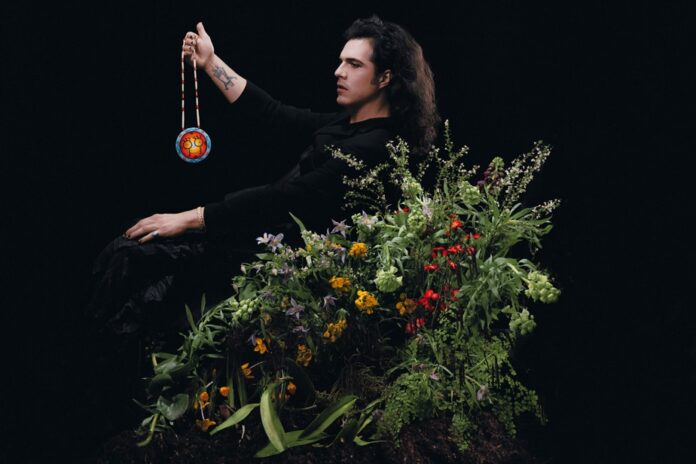Wolastoqey singer-songwriter Jeremy Dutcher is a voice whose words have specific purposes: to denounce, to mourn, to inform, to celebrate, to reconcile or to heal. In order to further pursue his quest for dialogue, he sings for the first time in English on his second album, Motewolonuwok.
Jeremy Dutcher almost gave up on music. “Something” happened, shook him up, and made him question the desire to pursue this path which nevertheless seemed completely destined for him. “Either I stopped and did something else, or I let myself go and did it for real,” he tells us on the phone, having just returned to Montreal after days in Europe promoting his new album.
Because, surprise, Dutcher made the decision to let go, to make this album, rather than stop. “My mother, already, was not going to let me give up,” he says, laughing.
The artist and activist from the Neqotkuk First Nation released his first album in 2018, a Polaris Prize-winning tour de force, on which he made it his duty to bring ancestral voices and melodies into the present, to resonate throughout the world. this powerful heritage within his community.
He did not expect the scope of his work to be so great. But, as his mother reminded him, his work became “bigger than him” and engendered conversations, listening. This is particularly why he chose, for this second album which he will release shortly, to no longer address only his own people. “On the first one, everything was in my language, with no translation. But if people are listening to me, then maybe it’s time to talk to them directly. »
“The most necessary conversation doesn’t necessarily have to happen within the community, but rather with those who need to hear these things and who have to face the fact that their ancestors committed certain acts,” says the artist and musicologist. These are discussions that we are already having in our communities. We already knew that residential schools had cemeteries. »
To give substance to these messages he sends in songs, an orchestra and a choir were invited to participate in making Jeremy Dutcher’s pieces even “bigger”. “A lot of people helped me make this album,” he says. This was another reason why I couldn’t turn my back on this project. All these people offered me so much, I couldn’t give up. »
This album leans toward maximalism, while the first was more “DIY and small.” “I worked with Owen Pallett, who did the arrangements and brought these orchestrations to life,” says Jeremy Dutcher. I have already written little things for orchestras, but never in the way he can do it, and you have to know your limits. There is no better feeling as a singer than being able to soar with my voice over this orchestra and these strings and these brass instruments. It’s something very special. »
Motewolonuwok, pronounced “Muh-del-wool-en-oo-wug,” is a word full of meaning. When asked to define it for us, Jeremy Dutcher, who reflects on his art in all its scope, warns us that it will take a long explanation to properly describe the term, which carries significant linguistic baggage linked to colonization.
“In one word, there’s a whole paragraph. Motew is “that which can be heard, but not seen”, something mysterious. A Motewolen is someone who can see what can be heard, but not seen. Some say the musicians are Motewolen. There is a magic in the way sound exists. I wanted to reclaim this term, because one way of seeing it is positive: we think of magic, of healing, of something beautiful. »
“But it wasn’t always seen that way,” he continues. In our dictionaries, created by people outside the community, Motewolonuwok is associated with witchcraft. Sometimes we lose the true meaning of words when translating them. We lose the nuance. »
For Dutcher, everything has a broader meaning, the meaning of words is of paramount importance. His work is a gateway to better understanding the realities he addresses.
“I hope it encourages people to come to the shows, because I can put the songs in context, because they are stories about our traditions, about our experiences, and I want people to understand them. »
On Motewolonuwok, it is about mourning, hope, resilience, legacy, prayer. “We see things in a binary way, separate, when there is so much in between,” he describes. This idea of joy and mourning, one against the other, of woman and man, one against the other. I want to talk about everything in between, on several different themes. There is still some of the conversation with the ancestors [that there was on the first album], but in a much less direct way. This time, I dig into my own experience and my own observations as a young Indigenous person. »
English is present on half of the disc, but there is just as much room for the Wolastoqey language. “So many people already write in English,” notes Jeremy Dutcher. I wanted to make sure we were still present. »
For him, it is a question of legacy, but much more. “The lack of resources makes it almost impossible to turn on the radio or go to the cinema and hear my language,” says the artist. That was never an option for me. So I want my creations to create this opportunity for young people to be in contact with our language. I was lucky enough to have people around me who spoke it, so I can understand it and use it. »
Jeremy Dutcher hasn’t given up on music. Fortunately. “I was going to move to the woods and abandon everything, but I was made to understand that I still had things to share. I am grateful [today] for this whole process. And to now be able to share the result with as many people as possible. »















